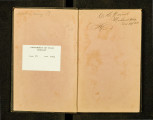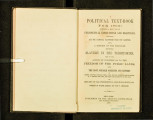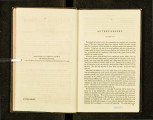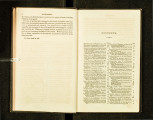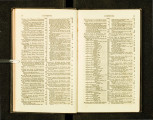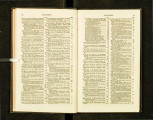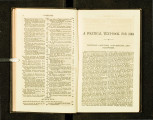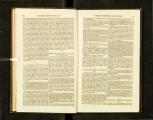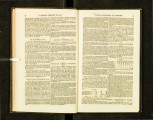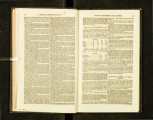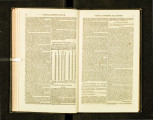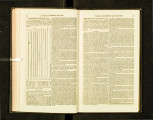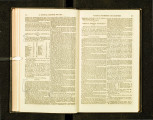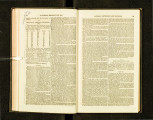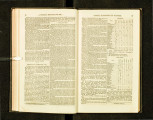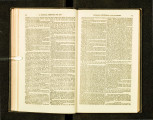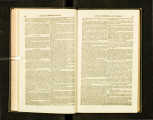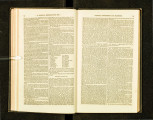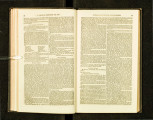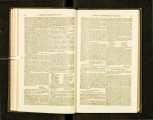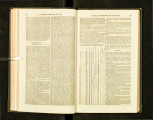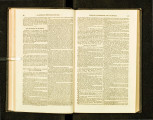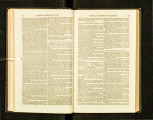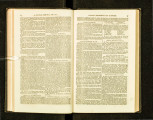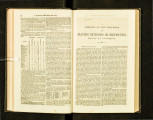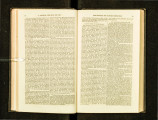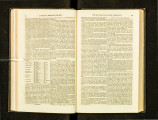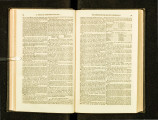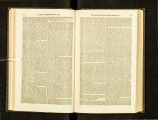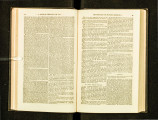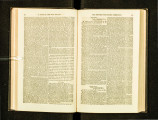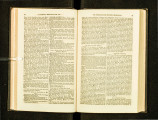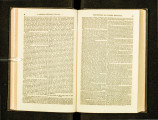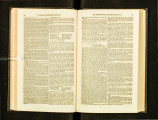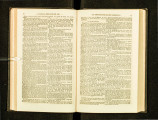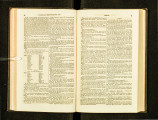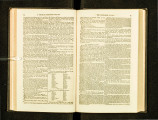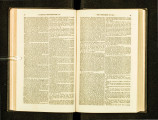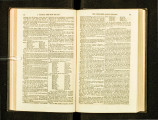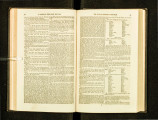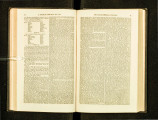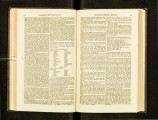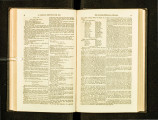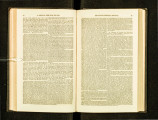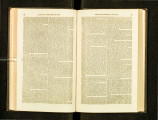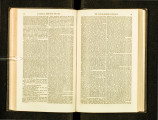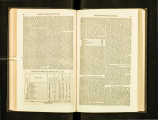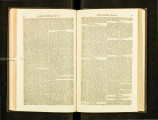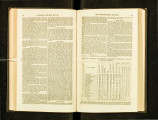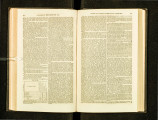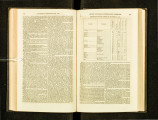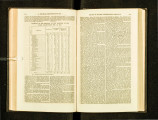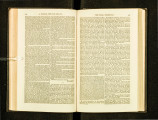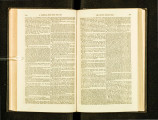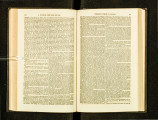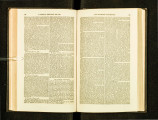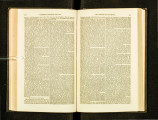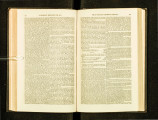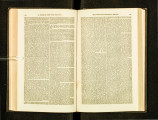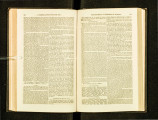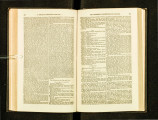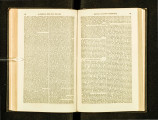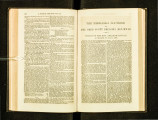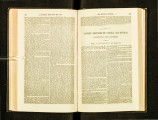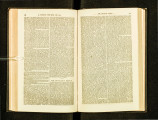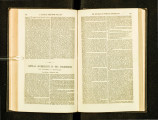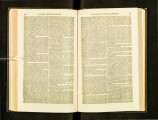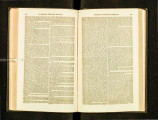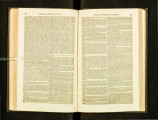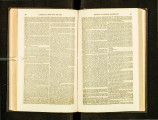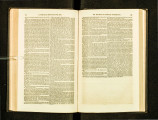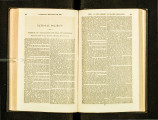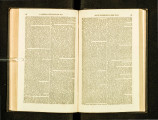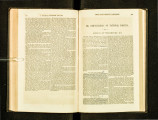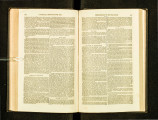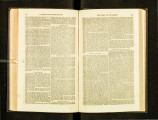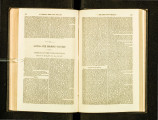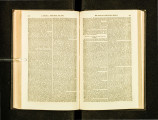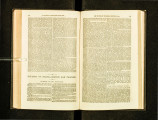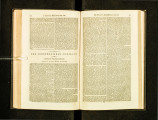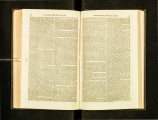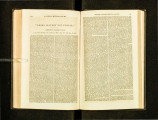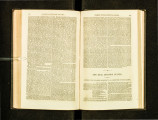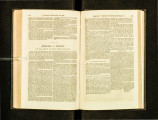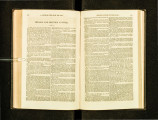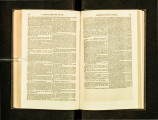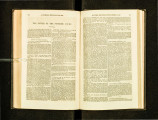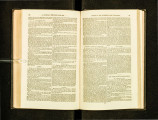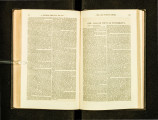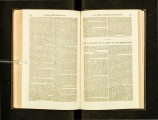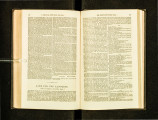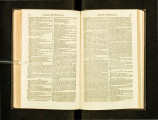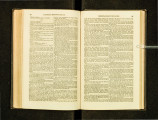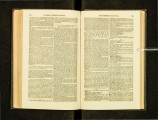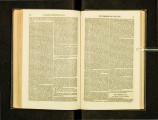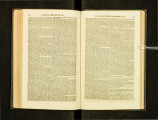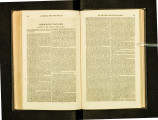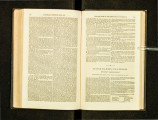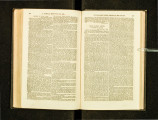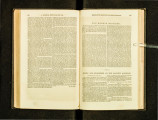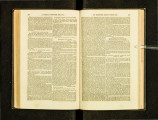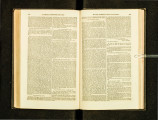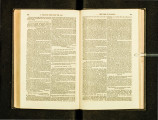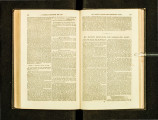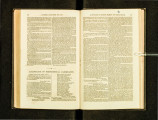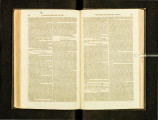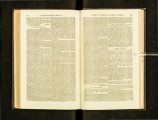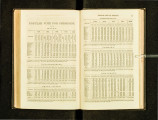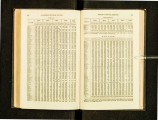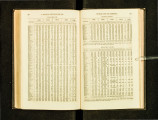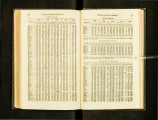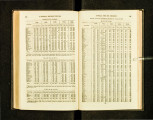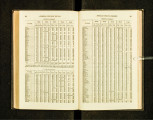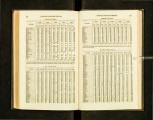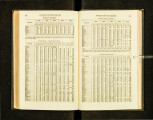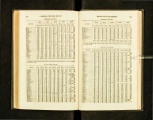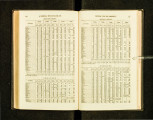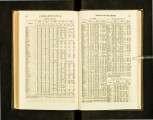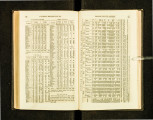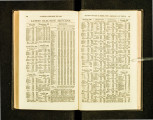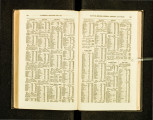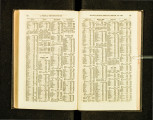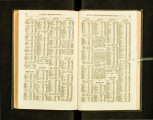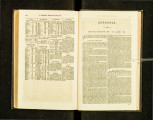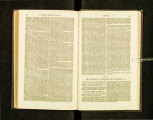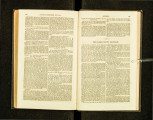| OCR Text |
Show 62 A POLITICAL TEXT-BOOK FOR 1('$00. ua~t "the further introduction of Slavery or Involuntary/ port and ma.lnta!n State rights,, which it conceives neee~~o ser.-ltudc, cxc.-pt for the puni~ltmenL. of crimtts whc:r~:of •.tHY ~o be supported and nauntnined, to y:eserve the t!l~ parly !11ta ll have been duly COIIVICled, shall l~e )~ro· h!Jertl(~~ of the free pe.op.le o( these UI,\Jted taLes, ~~ lllhit~:d; 1tnd that all children born within the saHI 1er- avo\vs rls solemn convrctiOn, that th7 ~~ates already rltory. afler it' adrnis~leon into the Union as a State, shall cor~fedcmted under one common ConstltUtlO.n, h:we nol he rre~:, but tll 'IY be held to service until tht: age of twt:nty· a nght to deprive new States of equal pnv!lcgC6 wlt.h tive yt'ar:~" themselves. Therefore, Rcllvlvod. That the Govc:rnor b~, and Jte is hereby, rt·/ Re~oloed, by the Genernl Assembly .or t.he Commonqnc: stctl to c.t n-e a copy of tho fon·g<llllg preamble and wealth of Kentucky, That the euator1:1 111 Congre,gs from re.solution to be trun-auitt etl t1> eaclt of the enators ancl this tate be instructerl, and the Representatives be ltc prcseututiv e~ of this ):)talc lu the Congress of the UniteJ requested, to use their errorts to procure the pas!!age or a s. 'llt:S law to admit the people or MisSQUrlinto the Unlou, &8 a 'wui on the ta ulc. State, whether those peopl~t will sanction Slavery IJy TnonsoA v, JJecember 16, 1819. their Constitution or not. Agreeably to the order or the clay, the llouse resumed the con!llueratlon of thl! resolutions postponed on the 14th lo~t. reillli ve to preventing the introduction of 8l;1very h;to f'tatcll hcreaftea· to be admitted into the union. And on the question," Will the House agree to the re3olution ?"the l'cas and Nays were required by Mr. Hanclall ancl lllr. ~oudcr, and stootl-Yeaa 74-(04 Democrat~, 20 Jo'edcrnlist:~); Nays none. Among the Yeas were Da l'id H Po a t<'r, late Uovernor, J osiah Han· dall o! Philadelphia, late Whig, now a leading Democrat, William Wilkin:!, late minister to Russia, since in the State enate, llr. Va.nlcl ::Hurgcon, late U. S. Senator, etc., etc. William l>uane, editor of The Aurora, then tlle Democratic org;lll, ul:;o voted for the resolutions, 11.'1 be h<Ld prominently advocated the principle they asserted. Rc80bviJd, 'l'hat the Bxecntive or this Commonwealth be requested to trant~mlt this Ue!!olution to t,he Senators and Representatives or thb State in Congres!!, that ll may be laid before that body for its consideration. The bill nuthol'izing Mi:=;souri tO fol'ltl n con. stitution, etc .. came up in th House as a special order, Jan. 21th. .Mr. Taylor, of X. Y., moTed that it be postpon 'U for one week: Lost: Yens 87; Nays 8 . Whereupon the House adjournetl. It was con~iderc d iu com· mittee the next day, as also on the 2 th and 30th, and thence debated daily until the 19th of February, when a bill came tlown from tho Scn;,~.te "to atlmit the State of .Maine into the Union," but with a rider authorizing the people of Missouri to form a State Con titution, et.<:., without restt·iction on the subject of Slavery. The Senate unanimously concurred, and the RCiolvea 1rue signed IJy Gov. Will irun .l.<'indlay. DF:r • .A.W.ARR. Iu Senate of the United States, early iu 1820, Mr. Van Dyke cO IIJillllnil:ated the following Re. olution of the Legi lature of tbe tate of Delaware, which were read: Reoolved, by the Senate and House of Representatives of the State of Delaware, in General Assembly met: 'l'hat it 1!, in the opinion of this General Assembly, the constitutional right of the United ::ltntes, in Congress assembled, to enact and establish, as one of the condi· tioos for the adruis ion of a new tate into the Union, a provision whlcla shall eiTectua.lly pa·event the further introduction of lavery into such State; and that a due regard to the true interc ts or such State, as well aa of the other States, require Umt the same should be done. Re&olived, 1'hat a copy or the above and foregoing r esolution be tran~mitted, by \he Rpcaker of the &nate, to each of the Senators and ltepresentatlves from U1is State in the Congress oC the United States. &:KNTUCJ>:Y. In Scn:ttc, J am~;u·y 24th, 1820, Mr. LoO'an communicateu the following preamble n.nd l{csolutions of the Lcgi lnture of the State of Kentucky, which were read: Wlw·eas, The .C~nstitution of the United States provides for the adrmssaon or new States Into the Union and it is just and proper tltat all such ::)talC!! should be c~tab· llshcd upon the footing of original States with a view to the preserv~tion or t:~tate Sovereignty, tite prosperity of such new Btate, and the good or their citizens; an(t wher ea&, successful attempts have been heretofo, e o,tad.e, and are. now !naking, ~o prevent the People of tile 'I erntory of Ah~SOUI'l from bemg :tdruitteJ into the uni•ID as .a tate, u nle.~s ~nun rnel ~d by rules and t·egulntiond whrch do not exr ·t rn the ong!nal States particularly in relation to the toleration or Slavery. I IPtet•etts, nl,o, if Con gress can thus trammel or control the po1rers of a 'l'erritory in the formation or a S.tate go.vernult.>u t, that ~ocly may, on the .same principle, reduce lls powers to httle more than those possessed by the peOJlie of the District of C(;iumbia, aud whilst pro fe:~ lng tu tnake it a ::!ovcrelgn l:ltate, may bind it in perpetual vas-a lage, aud re•!ul'e It to tl1e condition of a P o vi nee; su~:h ::::tate :-11ust necessarily become tho dependent of Cung"e:,s, a ·king such powers !lnd not the ludepeudcnt ::'tate, dcnrauding rights. An;t u;!1creu 8 It ltl ~ccesaa1·y, iu prel!lcrdug the ::!tat c Sovereignties ' in Lh~u: lli'CSea~t r .gli.ts,, Uaat uo new State should be sui). Jectcd to tlirs I'C~ I.nctlon, any ntore than an ole! one nod W1:1L there C<Ln ue no rea~o u or ju.;tice "'hv iL !lhould not be eutltleu to tlte ¥a.me privilegeq, whcr; it Is bound to bear all th~ burclenij nrul taxeo~ laid upon it by Cona-ress. l n pas:mtg .tl1e following t·esolution the General ~s~umbl~ refa:•LIIJS from exp!·e~sing any op'iuion either in / ra ~or 01 aga.ust lhe princtples of ::;lavery; but to sup- The House, very early in the session, passed a bill proviLling for the admis ion of Maine as a State. This bill came to the Senate, and was sent to its Judiciary Committee aforesaid, which amended it by adding a provision for Missouri as ahovc . .After severnl days' debate in Senate, Mr. nol'l'rt~, of Pa., moved to rccorun1 it, so as to strike out all but the ndrnis.sion of Maine; which wns dcfeat(•d (Jan. 1-Jth, 1 2tl)-Yea~ 18; Kay:~ 25. liereupou Mr '1'liortJa.", of' Il l., (who \'Otcd with the mnj ori ty, a~ Ulli!'or11li .\' n~a inst any restriction on Mis:;ouriJ ga vc Ut>Lil:e tlrat he should "nsk leave to bring a blll to prohibit the Introduction of ):)lavery into the Tert·ilmie8 of the United tata. North und W~t of tltc contemplated State of .M~ 80tt,ri ;" -which Ire accordingly diu on the 19th; when it wal.i read lllll.l orderetl to a th!rd reading. [l'i'OTK.- Great confusion and misconception exists In the public mind with regard to the "Missouri ltestrlo· tion," two totally cliffereut propositions being called by that u:u ne. 1'he oriyinal Hestriction, which 1\lr. Clay Yehemcntly opposed, and Mr. Jetrl!rsoH in o. letter characterized as a "fire-bell in the night," contemplated the li mitation or Slavery in its exclusion from the Stau oj' .Jf i !Ji!Unr l. This was uHimately det\:u.ted, as we shall see. 'l'he xecontl proposed nest rit.:tion "as that or Mr. 1'homa3, ju::.t cited, which proposed the exclusion ot lavery, not from the 8tate of 1\lissouri, but from ~M Te1•ritorie., of the Un-ited States N orth mul W'est ojthaJ Stole. 'l'his proposition d id not emanate fr om the origl· nal ~lis:;ourl lte~trlctionista, but r 0 111 th eir adversaries, anu was but reluctantly and partially accept<;d by ~WI former.) The Maine udrnis~ion hill. with the pl'oposed amendment~, was discussetl through several days, until, Feb. 16th. the que. tion was taken ou the J uti iciary Corn mit tee's a 111e11 dment8 (authorizing Mi ~~o uri to form u State Coustita· tion, and saying nothing of Slavel'y), which were adopted I.Jy the following vote: Yea8- Agalnst the Hestriction on MiBsourl, 23. [ 2u from Sin vc States ; ~ fr·om Fl'ee tates.l Nays- For Restriction, il. l I 9 from Free State!'!; 2 from Ddawart~.J ~lr. Tholllas, of Ill, then proposed his amf!nd· • TilE STRUGGLE F OR SLAVERY RESTRICTION. me11t, which, on the following day, he withdrew 11.nd substituted the following: .Afl.d be it /tertlter enacted, 'l'hat In all tl1at Territory teded by France to the United Sta tes under the nnme of Louisiana wlaich lies north of thlrt.y·slx degrees thirty minutes nort.h la titude, excepting only such part thereof as is Included within the limits of the 'tate contemplated by this act, ~l :tvcry and Involuntary servitude, othcrwiRe tkan In the punil:thment or crime whereof the party shall have been duly convicted, shall be and Is hereby forever prohibited. Providecl ctlwayB, that any person c.~c aping Into the same, from where lu.bor or service Is lawfully claimed In any State or 'l'errlt.ory or the United • tntes, such fugitive may be lawfully reclaimed and conveyed to the pel'sou claiming l1is or Ler labor or service as aforesaid. Mr. Trimble, of Ohio, moved n. substitute for this, somewhat altering the bouudarics of the regions shielded from Slavery, which was rejected: Yeas 20 (Northern); Nays 2,! (Southern). The ques tion then recurred on Mr. Thomas's amendment, which was adopted, as follows: Yea$-For excluding Sl:tvery from all the Territory North and vVcst of Missouri: Messrs. Drown of TAt., Mellen of Mass., Durrlll of Jt. I ., .Morrill of N. li., Dana of Oono. Otis of 1\fass., Dickerson or N. J., Palmer of Vt., Eaton of 'J'enn., PfLrrotL or N. H., Edwards of Ill., Pinkney or !ltd., Horsey of Del., Roberts of Pa., liunter of It. I., Ruggles of Ohio, J ohnson of 1\y., Sanford of N. Y., Johnson of La.. Stokes or N. C., King (Wm. R.) of Ala.., 'l'homas of Ill., King ( Rufus) of N. Y., Tichenor of Vt., Lanman of Conn., Trimble of Ohio, Leake of Miss., Van Dyke of Del., J .. owrie of .l'a., Walker of Ala.., Lloyd or Md., Williams of 'l.'enn., Logan of l{y., Wilson or N. J.-34.. Nays-.Against such Restriction: MtsSrs. Darbour of Vo.., Pleasants or Va., Elliott of Ga., Smith (Wm.) of S. C .• effect, though the more dctcr·mined champions, whe ther of • hwery Extcn ion or Slavery Restriction, did not unite in it.] The bill, thus amended, was ordcretl to he engro sed for a third reading by the following vote: Yeas- For the Mi souri Bill : Messrs. llarbour o! Va., Lloyd or Md., Drown ot La., Logan or Ky., Eaton of 'l'enn., Panott of N II., 1<~dwards of Ill., Pinkney of l\1 d., Elliott of On.., Pleasants of Ya., Oalllard of S. C., Stokes of N. c .. Horsey or Del., 'J'homas of 111., Hunter of R.I., Van Dyke of Del., J ohnson of J(y., Walker of Ala., J ohnson of La., Walker of Ga. , King of Aln., Will iams of Miss., Leake of ~lllis., Williu.tllS of 'l'enn-24. Nay.'i- Against the DiU : Messrs. Durrill or R. I., Otis of Mass., Dana or Conn., l'almer of Vt., Dicket·son of N. J ., Roberts of Pa., King of N.Y., Ruggles of Ohio, Lanman of Conn., Sanford or N.Y., Lowrie of Pa., Smith of S. C., .Macon of N. 0., 'J'ay lor of Ind., Mellen of Mass ., Tichenor of Yt., Morrill or N. H., 'l'rimble of Ohio., Noble of Ind., Wilson of N. J .-20. The bill was thus passed (Feb. 18th) without further division, and sent to the llouse for con· currence. In the llou e, Mr. Thomas's amenJ. ment (as above) was at first rejected by both parties, and defeated by the s trong vote of 169 to 18. 'l'he Y cas (to adopt) were, Messrs. Baldwin of Pa., Meech, of Vt., Dayly or llld., Mercer of Va., Bloomfield of N.J., Qua rles of Ky., Cocke of ~I.'enn., Ringgold or !lid., Crafts of Vt., Shaw or Mass., Culp epper of N. C., Sloan of Ohio, Innsey of N.J., Smith of N.J., Lathrop of Mass., Smith of Md., Gaillard of S. C., 'l';tylor of Ind., Macon of N. C., Walker of Ga., Noble of Ind., Williams of Miss.-10. [It will here be seen that the Re t r-iction ulti· mately adopted-that excluding Slavery from u;t territory then owned by the United States North and West of the Southwest border of the State of Mis, ouri-wn.s proposed by an early and steadfast opponent of the Rcstt·iction oriO'ioally propo ed, r cbtive to Slavery in the cgntcmplatcd Stn.te of Missouri, and was sustained by the votes of fourteen Senators from Slave States, including the Senators from Delaware, Maryland, Kentucky, Tennessee, Alabama, and Louisiana, with one vote each from North Carolina and Mississippi. Little of Md., Tarr of Pa·-18. Prior to this vote, the llouse disagreed to the log-rolling of Maine and Missouri, in to one bill by the strong Yotc of 93 to 72. [We do not give the Y cas and Nays on this decisfon; but the rnnjor·ity was composed of the repre-sentatives of the Ft·ee States with only four e x:· ceptions; and Mr. Louis McLane of Delaware, who was constrained by instructions from his legislature. llis colleague, Mr. \Villard Hall, did not vote.] The current assumption that this Restdction wa~ propose? by Rufus King, of New· York, and mamly su tamed by the antagonists of Slavery E!tension, is wholly mistaken. The trutu doubtless, is, that it was suggested by the mor~ moderate opponents of the proposed Restriction on Missouri-anti supported also by Senators from ~lave States-as a means of overcoming the ~eststance of the House to Slavery in Mia· so.un. It was, in effect, an oflcr from the nulder opponents of Slavery Restriction to the more moderate and flexible advocates of that Restri~tion-" Let us have Slavery in Missouri and we will unite with you in excludinrr it fro~ all the uninhabited territories North a~d West of that State." It was in substance au arrree· ment between the North and the South to0 t.hat Tbe members from Free States who voted with the South to keep Maine and Missouri united in one bill were, .MeSSl'S. n. Daldwln or ra., llenry Meigs ot N. Y., llloomfield of N. J., lienry Sba'" or Masa., The Ilouse also di agreed to the remaining amendments of the Senate (striking out there· striction on Slavery in Missouri) by the strong vote of 102 Yeas to 68 Nays. [Neal'ly or quito every Representative of a Free State voted in the majority on this division. with the following from Slave States: Louis McLane, Del., Nelson, Md., Alney .McLean, Ky. Trimble, Ky.] So the Ilouse rejected all tho Senate's amendments, and returned the bill with a corresponding message. The Senate took up the bill on the 24th, and debated it till the 28th; when, on a direct vote, it was decided not to recede from the attach· mcnt of Missouri to the Maine bill: Yens 21 ; ( 19 from Free States and two from Delaware ;) |



